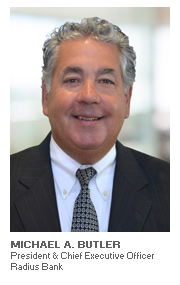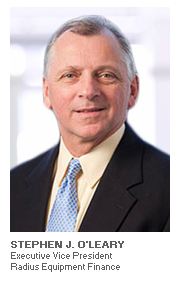
In December 2016, NewStar Financial announced the sale of its equipment finance business and related assets to Boston-based Radius Bank, an innovative, full-service bank. Over the years, many equipment finance professionals have described shifting from operating as an unregulated independent equipment finance company, to conducting business under a regulated community bank charter as -- challenging.
In the following interview with Steve O’Leary, Executive Vice President of the newly formed Radius Equipment Finance, and Michael Butler, President and Chief Executive Officer of Radius Bank, we learn how this independent equipment financing business fits into Radius Bank's strategy of expanding into niche areas of lending, and how this shift will create opportunities for expansion previously unattainable for this highly successful equipment finance team.
Equipment Finance Advisor: Steve, let’s start with you. NewStar Equipment Finance has operated as a diversified commercial finance company since inception in 2011. Does the acquisition by Radius Bank provide your group with any competitive advantages?
Steve O’Leary: Yes, it does. As an independent finance company, our cost of capital was very high and obtaining adequate funding through warehouse lines and asset-backed securitizations was very time consuming. A large percentage of my time was spent with our lenders and investors working to obtain adequate funding to provide the necessary leverage to run the business profitably and to generate adequate returns for our investors. As part of Radius Bank, our advantage is access to funding at a significantly lower cost. It will also allow me to spend more time facing the market to grow the business.
Equipment Finance Advisor: Michael, this acquisition marks the second national commercial lending expansion in 2016 for Radius Bank (the first being the establishment of the government lending business in May 2016). What is driving Radius Bank to expand into new lending specialties across a national geographic footprint?

Michael Butler: Radius is a forward-looking community bank; we think about community differently than other banks do. What I mean by that is rather than focusing on a geographic footprint view of community, we look at the market as communities of people in the leasing industry; the government loan guarantee business; the high net- worth financing specialty; the retail deposit platform. We believe this is the future for community banks.
Traditionally, community banks stay within their footprint, especially for commercial loans. However, when we have a specialty business such as the NewStar business and expertise in a particular product, we can easily target the community on a national scale. This also helps create a lower risk profile for the bank by limiting dangerous concentrations of geographic exposures.
On the retail side, our deposit gathering is supported on a virtual platform. We’ve created a virtual branch allowing customers to open and manage their accounts completely online. This allows Radius Bank to open over 1,000 banking relationships per week across the country. Our retail success allows us to match our deposits and assets nationwide.
Equipment Finance Advisor: Why is Radius Bank entering this specific niche lending market, middle-market equipment finance, and what specifically attracted you to NewStar’s equipment finance business?
Butler: First and foremost, it has to do with the people. At Radius we are all about the human capital side and we look for companies that are a cultural fit. Also, Steve and his team have a very successful track record and bring a tremendous amount of experience to the table. The cultural fit of Steve and his team, combined with their overall performance were driving factors to partner with this group.

Equipment Finance Advisor: How will the fact that the equipment finance business is now subject to banking regulations impact NewStar’s previously successful go-to-market strategy within the middle market? Will the group’s target customer profile change under the bank’s ownership (or perhaps expand)?
O’Leary: Since inception of the business as part of NewStar, we implemented a bank-oriented philosophy focused on disciplined credit underwriting. Our underwriting practices resulted in minimal credit losses – with only $150,000 in credit losses against $300 million in originations, and today we have no delinquencies. We have a well-defined underwriting process which effectively balances credit discipline with responsiveness to the market. The entire group has bank experience – having previously worked in a regulated environment – so our go-to-market strategy will not change.
Additionally, our target market under Radius Bank will actually expand because of our ability to price effectively to compete for credits on the higher-end of the credit spectrum – where we haven’t been able to compete in the past. It’s noteworthy that during the last three years under NewStar we lost close to $400 million of business that we felt comfortable underwriting from a credit perspective. We lost these deals strictly on pricing. Our go-to market strategy won’t change; we will continue to seek middle- market companies with strong credit profiles, sustainable business models and we believe overall our credit profile will improve due to our ability to price effectively to win deals we previously had to turn away due to price. We believe we are in a very good position to take advantage of the market as we have a strong reputation and we can now expand into markets we wanted to pursue, but were unable to due to pricing constraints.
Equipment Finance Advisor: Please explain the impact of this acquisition on the existing NewStar team – more specifically, do you anticipate any significant changes to the equipment finance unit in any particular areas of responsibility (e.g. business origination, credit underwriting, asset management, operations)?
O’Leary: Our entire team has remained intact. We intend to run somewhat independently as we did at NewStar – where we had our own underwriting capabilities and direct origination teams. However, we report into the bank’s credit unit and work with the bank to ensure all parties are comfortable with our transaction underwriting. Just yesterday we had a quarterly review with the chief risk officer of Radius Bank for example. We will be keeping the Radius Bank risk management team involved as much as they want and need to be involved. We are all very excited about this new opportunity.
We are looking to grow the team, with an initial focus on expanding the business origination team in the southeast, southwest and west coast markets. With our effective utilization of technology and the experience of our credit and operations teams, we feel our model is very scalable, so we will not be looking to expand the backroom side… at least not in the near term.
Butler: Based on my experience with finance companies, I believe it’s very important to allow Steve the flexibility to exercise his expertise and add value to the business he is building. We will provide Steve strong funding, good growth opportunities, and allow his team to reach the highest level of performance they are capable of achieving within our organization.
Equipment Finance Advisor: How will the bank lenders and equipment finance specialists work together?
O’Leary: I don’t anticipate a lot of interaction or referrals between our team and the Radius Bank lenders, because there’s not a lot of cross-over in the markets we cover. Part of the acquisition market thesis was that we provide diversity to Radius Bank’s asset generation platform. The companies we deal with are in the higher end of the middle market, so initially, based on the asset generation platforms that Radius has in place at this time, I don’t see much cross-referral business.
Butler: We are not a big believer in the concept of needing to cross-sell multiple products to a particular client. At the end of the day, each of our businesses needs to be stand-alone businesses. I believe that over time as we grow and get closer with clients, it will be beneficial for our commercial lenders to have the opportunity to refer a deal to Steve if there’s leasing opportunity. But this is a nice to have, not a requirement.
Equipment Finance Advisor: Michael, what is your vision for the equipment finance unit now that it is part of the bank? Do anticipate expanding beyond their middle-market specialty?
Butler: I think part of the fun that Steve and I will have is discovering how we can expand into other verticals that surround the leasing business and make it a more valuable organization overall.
Equipment Finance Advisor: Steve, please describe your near-term outlook for the middle-market equipment finance industry as we enter 2017.
O’Leary: Looking out twelve 12 months, I think the market will be strong as capital expenditures continue to increase due to pent up demand. I think 2016 was a slow year for many different markets for equipment finance, and I believe this was due to the uncertainty surrounding the election, and various tax and trade policies, as well as potential changes in the healthcare system. We have a very strong pipeline already – as a matter of fact, it is one of the strongest pipelines we have had this early in the year over the past three years. I am cautiously optimistic for the middle- market equipment finance industry.